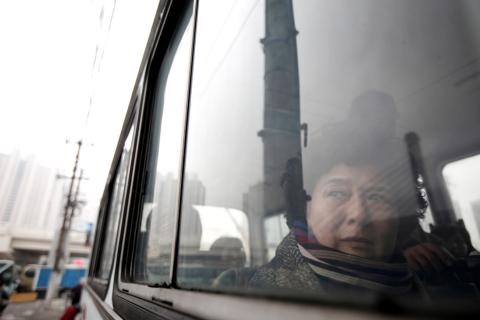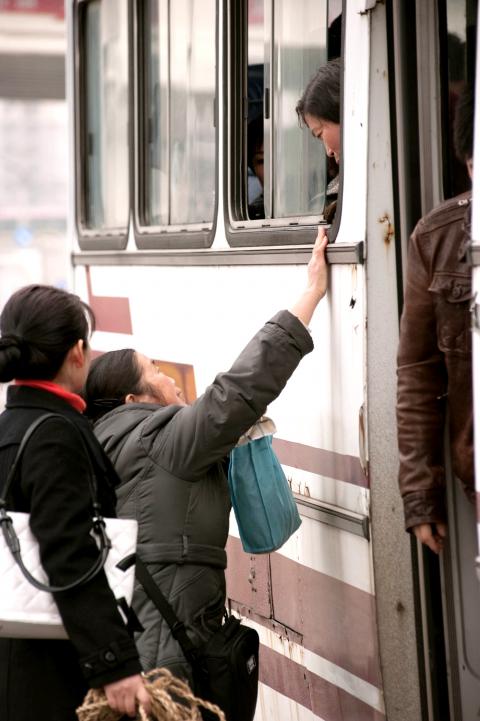Nearly a decade after releasing Love at 7-11 (7-11之戀), veteran commercial director Teng Yung-shing (鄧勇星) follows up his debut feature with Return Ticket (到阜陽六百里), a realistic and engaging drama about migrant workers living in Shanghai.
Teng’s years of experience working in China show: the film is funded by Chinese backers and set in Shanghai with a cast of Chinese actors supplemented with a few from Taiwan.
The movie centers on Cao Li (Qin Hailu, 秦海璐), who leaves her home in Fuyang, Anhui province, to escape an abusive marriage. After working at a clothing factory for a few years in Shenzhen, Cao moves again when the business closes, this time to Shanghai, where she shares a ramshackle apartment with Xie Qin (Tang Qun, 唐群), an older woman from her hometown.

Photo courtesy of Atom Cinemaf
Cao finds a job as a cleaning lady, but Gou (Li Binbin, 李彬彬), a hustler who also hails from Fuyang, knows she is capable of something much grander.
Gou and his friend Jiuzi (Shen Yiquan, 沈羿銓) hatch a plan to repair a discarded bus to transport Fuyang natives living in Shanghai home for the Lunar New Year holiday, and persuade Cao to help sell seats for the journey in return for a share of the profits.
One after the other, Fuyang women working as nannies and housekeepers in the big city buy tickets. Exhausted after years of hardship raising her only child, Xie joins the group. Yet Cao chooses to stay in Shanghai, not knowing what home really means to a wandering soul like her.

Photo courtesy of Atom Cinemaf
The film’s quiet, slice-of-life style reflects the works of Hou Hsiao-hsien (侯孝賢), who served as the executive producer for the project. Through the lens of cinematographer Hsia Shao-yu (夏紹虞), Shanghai sheds its metropolitan glitz, and what emerges is the city’s rather run-down underbelly, inhabited by workers from the provinces.
The protagonists are often framed by long, static takes and delineated with a chiaroscuro look, especially indoors where they are sometimes heard, but not seen. For the main part, the film steers clear of sentimentality. Emotions are modestly expressed, as exemplified by one of the work’s most resonant scenes, in which Xie finds out that her good-for-nothing paramour has stolen Cao’s savings and mobile phone.
Return Ticket’s sense of truthfulness is also reflected through the strong performances delivered by the film’s cast members, including nonprofessional actors and acting veterans such as China’s Tang, who won the best supporting actress at this year’s Golden Horse Awards (金馬獎) for her controlled, yet powerful, portrait of a hardy mother.

Photo courtesy of Atom Cinemaf
Multi-talented actress Qin is also convincing as a migrant laborer, and appears at ease working alongside amateur actors, who in real life are immigrant workers. Qin is also credited as one of the five cowriters of the script, which was awarded the Best Original Screenplay Golden Horse Award.
Though the topic is bleak, there is plenty of hope to be found in Return Ticket, which at times is both warm and funny.

One of the biggest sore spots in Taiwan’s historical friendship with the US came in 1979 when US president Jimmy Carter broke off formal diplomatic relations with Taiwan’s Republic of China (ROC) government so that the US could establish relations with the People’s Republic of China (PRC). Taiwan’s derecognition came purely at China’s insistence, and the US took the deal. Retired American diplomat John Tkacik, who for almost decade surrounding that schism, from 1974 to 1982, worked in embassies in Taipei and Beijing and at the Taiwan Desk in Washington DC, recently argued in the Taipei Times that “President Carter’s derecognition

This year will go down in the history books. Taiwan faces enormous turmoil and uncertainty in the coming months. Which political parties are in a good position to handle big changes? All of the main parties are beset with challenges. Taking stock, this column examined the Taiwan People’s Party (TPP) (“Huang Kuo-chang’s choking the life out of the TPP,” May 28, page 12), the Democratic Progressive Party (DPP) (“Challenges amid choppy waters for the DPP,” June 14, page 12) and the Chinese Nationalist Party (KMT) (“KMT struggles to seize opportunities as ‘interesting times’ loom,” June 20, page 11). Times like these can

Dr. Y. Tony Yang, Associate Dean of Health Policy and Population Science at George Washington University, argued last week in a piece for the Taipei Times about former president Ma Ying-jeou (馬英九) leading a student delegation to the People’s Republic of China (PRC) that, “The real question is not whether Ma’s visit helps or hurts Taiwan — it is why Taiwan lacks a sophisticated, multi-track approach to one of the most complex geopolitical relationships in the world” (“Ma’s Visit, DPP’s Blind Spot,” June 18, page 8). Yang contends that the Democratic Progressive Party (DPP) has a blind spot: “By treating any

You can tell a lot about a generation from the contents of their cool box: nowadays the barbecue ice bucket is likely to be filled with hard seltzers, non-alcoholic beers and fluorescent BuzzBallz — a particular favorite among Gen Z. Two decades ago, it was WKD, Bacardi Breezers and the odd Smirnoff Ice bobbing in a puddle of melted ice. And while nostalgia may have brought back some alcopops, the new wave of ready-to-drink (RTD) options look and taste noticeably different. It is not just the drinks that have changed, but drinking habits too, driven in part by more health-conscious consumers and